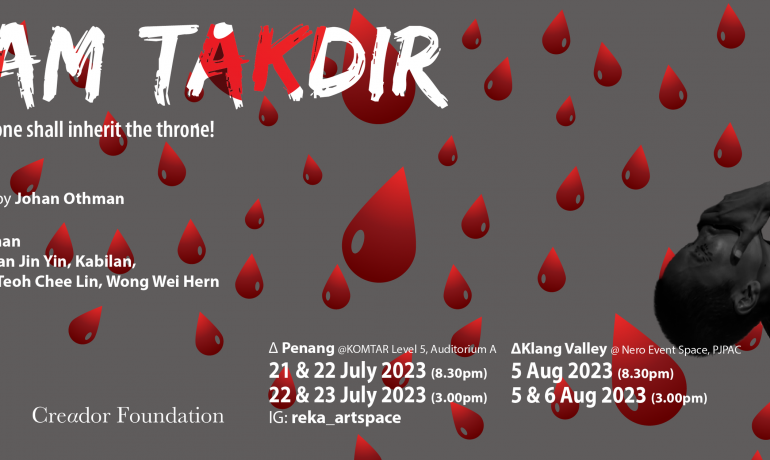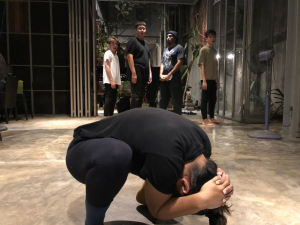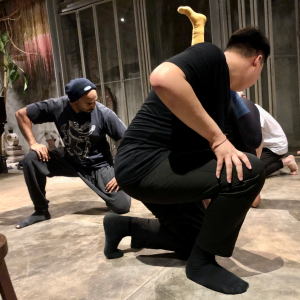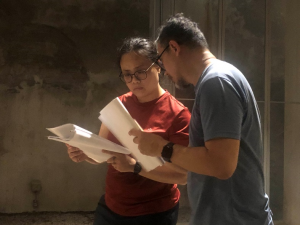Malam Takdir is a new opera written by Johan Othman and directed by Chee Sek Thim. In this interview, we discuss the creative and practical decisions that have shaped the staging of this play.
By Yee Heng Yeh
In the Mahābhārata, the major Sanskrit epic of India, the Kurukshetra War saw all one hundred sons of the blind king Dhritarashtra slain in battle. This story planted the seed of an idea in the mind of composer and lecturer Johan Othman, leading him to work on a script that would become an opera in Malay—Malam Takdir (a title that might be translated as The Fated Night).
This year’s staging of the opera features Hilyati Ramli as the lead actress and the soprano Tan Jin Yin, helmed by the direction of Chee Sek Thim. These are familiar names in the local performing arts scene, but besides these veteran figures, there is also an ensemble of younger actors: Desmond Ngooi Chi Xian, Kabilan, Teoh Chee Lin, and Wong Wei Hern. In this conversation with Johan (who also serves as the production’s music director) and Sek Thim, we talk about the themes of the play, how it uses language and sound, and the rehearsal process.
Malam Takdir is inspired by an episode from the Mahābhārata and imagines a conversation between Dhritarashtra and his advisor Sanjaya. What was it about this particular story that made you want to explore it as an opera?
JO: I’ve always wanted to write an opera that examines philosophical issues while still telling an interesting story. The concept of an intimate conversation between a blind king and his personal attendant and friend drew me in and inspired me to create and write the libretto for Malam Takdir. Given that there are no substantive discussions between the blind monarch and his attendant in any of the epic texts, I was willing to imagine their interactions in the setting of the epic.
Sek Thim, you directed Johan’s first opera Conference of the Birds in 2009, and later worked with him in Never Trust a City with No Ghosts (2016). Malam Takdir itself has also gone through years of incubation and development. Has this process of extended collaboration shaped your approach in directing this work?
ST: Yes. The approach we took in this production was possible only because of the level of trust that has been built between us over time. This trust is important because it enables us to take chances and be creatively vulnerable without fear.
Instead of a completed music score when we started our rehearsals, Johan presented me with a menu of rhythmic patterns, sparse melody lines, and sound nuggets, which he had devised in a workshop with the actors. I was free to make use of it in ways I saw fit. In effect, Johan allowed me space to take part in constructing the score, which I feel is a big concession from him. So, in our rehearsals, a lot of requests, suggestions, counter-suggestions, and pushing back and forth went on as we shaped and put things together. It’s exciting and unnerving at the same time.
The play was initially conceived as a libretto in English (and even had a reading featuring Karen Lai and Lawrence Lim) before it was revised to be in Malay. What drove this choice of language?
JO: It was a decision based on the availability of actors in Penang who are comfortable with performing using the English language—there aren’t many. Sek Thim and I decided to translate it to the Malay language when we made our final decision of having Hilyati Ramli and Riz Zolkepli play the Blind King and Attendant respectively.
Yes, when Malam Takdir was first staged as a workshop performance in 2019, it was Sek Thim’s “first foray into the world of Malay language theatre”. How has your relationship to the language changed over the course of this production, Sek Thim?
ST: I was already in a comfortable place when we started in 2019. It may be because Johan wrote the script in English, and then translated it into Malay, or perhaps because I was allowed to partake in the entire writing process at such an intimate level. It was exciting nonetheless, being quite a different thing from writing karangans in secondary school. I revelled in it and got the actors to work the language with as much bravado.
The time that has passed since we started this project has provided “distance” for me to re-look at the text with a calmer state of mind. I’m appreciating more deeply the evocative nature of the language this time round. I’m moving more slowly, and I’m noticing that the images and metaphors that emerge hit new chords. Some are really quite jaw-dropping, in my opinion. Also, between these two productions, I had the opportunity to work with students from USM on Usman Awang’s Uda dan Dara, which was an important lesson for me in the appreciation of the Malay language. This experience certainly contributed in no small measure towards deepening my perspective.
Throughout the performances and staged readings, were there any significant changes made to the script or musical composition?
JO: After further discussions and very interesting suggestions from Sek Thim to include the idea of Bhumi—a personification of mother earth—into the story, another persona that is Suara was added, representing Bhumi, who sets the entire play into a larger context. This addition presents the underlying universal cycle of creation and destruction that involves the conflation of both the divine and mortals, and gives more depth to the original theme of the meaning of fate.
In terms of the music, I have learned so much from the workshops that in turn informed the music compositions and its constant revisions. The concept of the music too went through a major change; both in terms of its aesthetics and performance approach. I also asked Sek Thim to help with shaping further the ideas for the sounds that comes purely from the actors. Sounds includes both various effects and music.
What are the challenges of directing an opera?
ST: In an opera, everything is scaled-up, and emotions can easily turn very loud and exaggerated. Half the time, I’m walking that tight rope, trying to keep a balance between embracing the gorgeousness of its size and preventing it from becoming a caricature of itself.
I also find it a challenge to work out a relationship between spoken and sung text, how they move in and out of each other without becoming too separated.
For Johan: was there anything that surprised you, or stood out to you, in the past or current staging of Malam Takdir?
JO: Sek Thim’s interpretation and the actors’ translation of the text into a performance in many instances impressed me in terms of how widely a text can be imagined from various angles. One major example is the use of multiple actors to portray the role of one attendant to represent the thoughts and conflicts in the mind of the Blind King. Another is the casting of a female actor for the role of the Blind King, which I think works very well. I have also learned that the creative process works surprisingly so well in theatre when it is shared amongst each other.
Is there anything you hope the audience would take away from watching this performance?
ST: I hope the audience will be able to have an experience that transcends the ordinary, and that the resonance of this experience can be attractive enough that they might want to return to the theatre again and again. This is what I want to be able to give to my audience with this production, at least.
Malam Takdir
21 & 22 July 2023 @ 8:30pm
22 & 23 July 2023 @ 3:00pm
Venue: KOMTAR Level 5, Auditorium A, Penang
Ticket: RM50
https://forms.gle/CBKcQh2tJZS3Z2Yt7
For more details, check out Reka Art Space on Facebook or Instagram.
Yee Heng Yeh is a writer and translator. His work is featured on The KITA! Podcast, adda, Strange Horizons, NutMag, Nashville Review, Guernica, Apparition Lit, and SUSPECT. He is on Twitter as @HengYeh42.




